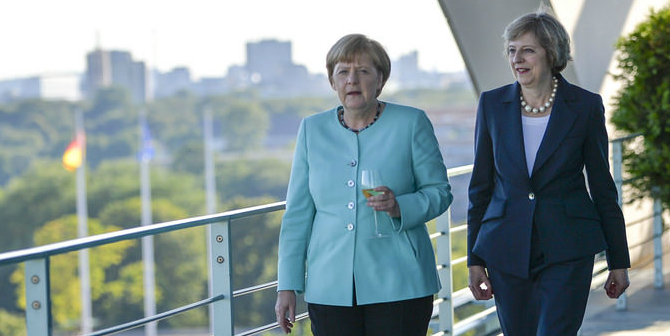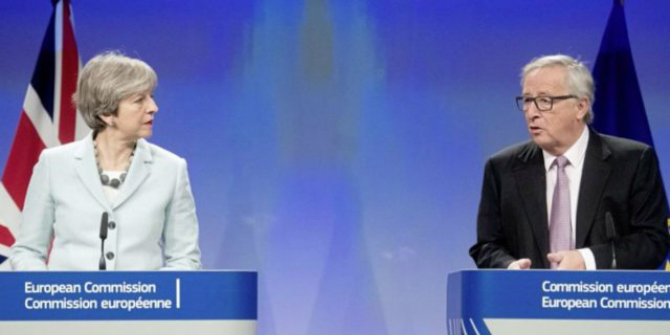 German coalition talks are not likely to produce a new government until January 2018. This will slow down the Brexit process, argues John Ryan (LSE Ideas). He also suggests that Theresa May should not rely on being able to gain support for her demands from Angela Merkel, whose chief political interest will be in keeping the EU-27 together and forming a new government coalition over the next 8-12 weeks in Germany.
German coalition talks are not likely to produce a new government until January 2018. This will slow down the Brexit process, argues John Ryan (LSE Ideas). He also suggests that Theresa May should not rely on being able to gain support for her demands from Angela Merkel, whose chief political interest will be in keeping the EU-27 together and forming a new government coalition over the next 8-12 weeks in Germany.
The results of the German election mean that there will be coalition talks between Chancellor Merkel’s Christian Democrats CDU/CSU and the Free Democratic (FDP) and the Green party. Those talks are likely to last until December 2017. This means that Germany may have a new coalition government in January 2018. This makes the political climate in which any Brexit negotiations are taking place more uncertain.
Due to the European debt crisis, the increasing threat of terrorism, and the refugee crisis, conflicts and divergences have been on the rise among EU members. The resurgence of extremism and populism has undermined the EU’s internal cohesion, creating new troubles for European integration.
For Germany, clearly, the weight of the “market-friendly/liberal” block in the EU (whose current core members include the UK, the Netherlands, Sweden, Denmark and Estonia) will decline with Brexit, potentially making the EU less market-friendly. The EU budget would also have to do without UK financial contributions.
Brexit could set a new and awkward precedent for national exit movements elsewhere in the EU
But the real political risk is that Brexit could set a new and awkward precedent. It could trigger chain reactions, such as a backlash against any notion of an “ever closer union”, even where this makes obvious sense, as in the areas of defense, foreign policy, defending the external boundaries of the EU, and certain aspects of environmental policy. Brexit could also encourage national exit movements elsewhere.
The Czech Republic, Hungary, Poland and Slovakia have been critical of Germany’s migrant policy. Voters in Spain, Portugal, Greece and Ireland have recently also supported political parties of a more radical outlook that have gained support as voters turn away from the old political establishment. The big story in the German elections is the emergence of the right-wing Alternative für Deutschland (AFD) as the third largest party in the German parliament. The AFD has benefited most from the anger of some German voters to the migration, EU and euro policies of Merkel.
Although a British withdrawal from the EU wouldn’t turn Germany into a hegemon, it could somehow isolate the most powerful member of the Union. It could increase the perception of German dominance and with it add pressure to form coalitions to counterbalance its power. Paradoxically, therefore, Germany could actually become weaker – that is, less able to get what it wants – in an EU without the UK. Meanwhile, expectations of Germany would probably increase further.
After Brexit, Germany could actually become weaker in the EU
The UK is Germany’s third largest export partner with €90 billion in sales last year. The country’s nominal exports to the UK increased by 50% between 2010 and 2015. No less than 7.5% of all German goods exports were sold to Britain in 2015, a large number, given that the UK does not purchase many machine tools or other heavy products of the sort Germany also specializes in, unlike emerging economies.
With subdued domestic demand, Germany and the EU depend on trade-induced moderate growth including close trading relations with Britain. Nine EU countries send at least 5% of their total exports to the UK. In 2015, Germany’s trade surplus with the UK alone was a staggering €51 billion, about 20.5% of Germany’s entire trade surplus.
Against this backdrop, the structure of German industry helps explain why Berlin is not, and has never been, really interested in developing a single market in services. Germany’s economy is focused on the export of goods rather than services, which is why the single market works particularly well for them.
Germany has never been really interested in developing a single market in services
The topic of the EU budget is particularly relevant to Germany as the EU-27 also needs to work out how the absence of Britain’s net contribution of €7 billion to its budget can be compensated for by 2019. Net recipients of the EU budget will call on Germany to pay more in the future.
 Image by Number 10, (Flickr), licenced under CC BY-NC-ND 2.0
Image by Number 10, (Flickr), licenced under CC BY-NC-ND 2.0
Germany’s role in shaping the agreement between the UK and EU will be crucial. While different coalition partners after Sunday’s election may tip the balance in favour or against the UK, ultimately it’s unlikely to shift the general direction of Brexit negotiations significantly. A so-called Jamaica coalition of CDU/CSU, FDP and the Greens is unlikely to deliver any Brexit shocks.
In the UK, after its election in June 2017, there is probably no House of Commons majority for Theresa May’s version of a “hard” Brexit. The UK-EU must agree on the status of UK and EU citizens, Northern Ireland and the divorce bill for leaving the EU before they even discuss any trade deal. There is a view that the UK has not done the groundwork for the trade negotiations. This UK government has come under more concerted attack domestically. Merkel, EU governments and institutions are almost bemused by the lack of preparation shown by the May government.
Despite the fact that the UK does not use the Euro, Brexit will have important implications for the European Monetary Union’s future. The UK’s significant financial sector and the loss of its budgetary contributions will lead to numerous EU reforms in the wake of its exit. Germany will lead the EU in taking advantage of this. Germany and the EU will be mindful of the benefits that London’s financial markets have provided in the past and will not make Brexit unnecessarily disruptive. After the initial Brexit shock, Merkel and the German political and business elite have come to realise that the EU should use post-Brexit reforms as an opportunity to strengthen the Eurozone and make it more robust against future crises.This may
This may be questioned because the French President Emmanuel Macron wants a common Eurozone budget, a European finance minister and a Eurozone parliament, and he thinks Germany and the EU should boost investment. The CDU/CSU, however, are sceptical of France’s plans and the FDP have taken a very strong position against Macron’s proposals in the German election campaign. The Greens are in favour of the Macron proposals but it looks like Merkel will have very little leeway to compromise with the French.
Cooler heads in London and Berlin do not want a “hard” Brexit
Having said that, the UK and the EU appear to still be in two completely different worlds: the UK only wants to talk about trade deals; the EU about divorce bills, citizens’ rights and the Northern Ireland border. The slower the progress, the tenser the negotiations. The UK has been accused of being unprepared and not knowing what it wants, the EU of inflexibility and blackmail. Cooler heads in London and Berlin do not want a “hard” Brexit which looks like the more likely outcome. Given the confusion and disagreements about what a final post-Brexit deal with the EU might look like, there has been an increased focus on a potential transitional arrangement. Merkel will want to address these problems once a new coalition government is formed. She will want to provide breathing space for the UK and avoid a damaging Brexit for Germany and the EU. It is essential for the UK and EU that there is minimal disruption to banking and financial services. Although it was telling that Brexit was not discussed in the election debate between Merkel and her Social Democratic Party (SPD) opponent Martin Schulz.
UK often overestimates its ability to win support from Germany
The UK often overestimates its ability to win support from Germany. In recent years, there have been a number of occasions where the UK believed it had German support, but it turned out not to be the case. For example, the UK thought it had the support of Germany in the negotiations on the Fiscal Pact as well as the appointment of Jean-Claude Juncker as Commission President. On both occasions, Germany decided to change its position and leave the UK isolated. Also during the pre-referendum negotiations, Germany was not willing to give the UK government certain concessions on labour mobility, which would have helped them to present a convincing case to the UK electorate to remain in the EU.
May continues to repeat her Brexit mantras and remains an optimist
May continues to repeat her Brexit mantras. She tries to project the image of getting on with the job, working to get a good deal, always talking as if the outcome is certain. But it is not certain at all. May’s speech in Florence on 22 September has been welcomed as a small step in the right direction. The lack of detail is persistent though in areas such as citizens’ rights and especially Northern Ireland. May remains an optimist on Brexit, but close observers think even she makes the fatal mistake that sank David Cameron, of thinking all this can ultimately be sorted between politicians.
The UK government should therefore not rely too much on being able to gain support for its demands from the new German coalition government under Merkel which will be most likely made up of the Christian Democrats (CDU/CSU), the liberal Free Democratic Party (FDP) and the Greens who are pro-European parties. Merkel and the EU27 have made it clear that the UK must make progress in the negotiation with Michel Barnier on Northern Ireland, the divorce settlement and EU citizens’ rights before any trade talks can start. Merkel’s political interest in keeping the EU-27 together outweighs any interest the German car industry or any other industry has in the British market. After a poor election result, she will have other issues that will be a priority over the next twelve weeks.
This article gives the views of the author, and not the position of LSE Brexit, nor of the London School of Economics.
Professor John Ryan is a Fellow at LSE Ideas (International Strategy and Diplomacy). He was a fellow at St Edmund’s College, University of Cambridge, and at the European Integration section of the German Institute for International and Security Affairs, Berlin, Germany.







The UK is leaving in March 2019. The EU does not appear to be remotely grateful for the contribution the UK has made, albeit reluctantly, in the development of the EU project. The EU negotiators are not remotely interested in accommodating any of the UK’s responses to their dictated terms. In Great Britain after forty years of increasing rule from Brussels more than a generation of young Britons have ceased to recognise the value of their birth- right as British citizens. In this respect the EU has succeeded in its effort to end nationalism. The consequences are clear to see today. Britain is a weakened and divided nation with too many afraid to have confidence in their country’s skills and enterprise. Hence the UK negotiators do not have confidence they would be supported if they told the EU negotiators to get stuffed and simply walk away without any agreement. Only the EU negotiators can ensure a hard Brexit.